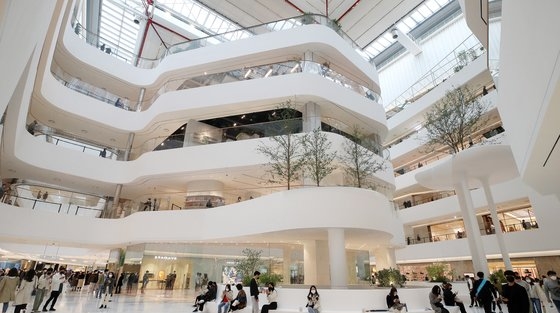In Korea, a new concept of the shopping mall has emerged with retail therapy. I’m sure you have heard of this word. Retail therapy is the act of shopping to relieve emotional distress and feel better. In combination with the offline retail industry, it gives us a new concept. It is a nature-friendly space where you can easily access nature in cities, allowing people to relax and provide healing through shopping. The offline retail industry is trying to attract consumers with various creative ideas to survive in zero-contact lives.

Due to Covid 19 outbreak, almost every part of our daily lives turned ‘out of touch’ for safety. As people are now getting used to their lives with Covid 19, online retail or e-commerce sales have increased significantly. Before the social distancing policy, consumers reduced going out and replaced daily necessities and other grocery purchases with online shopping. Although offline retail sales decreased by 3.6 percent in 2020, online retail sales increased by 18.4 percent. The differentiation of the offline retail industry due to the growth of online markets is becoming essential.
They did intriguing, out-of-the-box thinking, introducing the concept of retail therapy. The modern Seoul, a first nature-friendly future department store, is one example. The popularity of this place is making the rounds due to its innovative composition. They increased nature-friendly space, reducing store area which is a space for selling goods. Almost half of it is for indoor landscaping and customer rest areas. There is a waterfall garden with artificial waterfalls on the first floor. A sound forest, an indoor green park on the fifth floor, is also decorated with 30 trees and various flowers. It allows consumers to feel nature indoors and provides pleasant shopping. It maximized natural lightings on all floors by introducing a void, an architectural technique that opened the entire building from the ceiling to the ground floor. It did not even name itself a department store with the goal of a differentiated complex cultural space. Beyond the simple sales space, it adds differentiated elements for cultural experiences, adding attractions, entertainment, and food. They drastically challenged the stereotype that a department store should make customers lose track of time and focus more on shopping.
As people spend a lot of time in the digital world, they feel emptiness and stress. The key to retail therapy is emotional healing through consumption behavior. It could be retail therapy to go on vacation for the way even if it’s expensive or to refresh ourselves by eating delicious coffee and food in a scenic place even for a short time. By focusing more on the people themselves, the offline retail industry provides a healing space where many people want to spend their time. People could more relieve stress, psychological deficiency, and isolation due to disconnection through consumption. The department store is now evolving into a healing space by applying therapy concepts that heal consumers tired of the corona.
Nahyun Lee
K-UNIV Reporter



